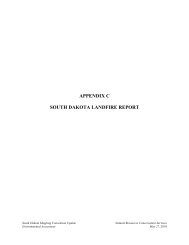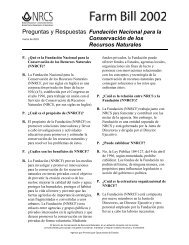The Ozette Prairies of Olympic National Park - Natural Resources ...
The Ozette Prairies of Olympic National Park - Natural Resources ...
The Ozette Prairies of Olympic National Park - Natural Resources ...
You also want an ePaper? Increase the reach of your titles
YUMPU automatically turns print PDFs into web optimized ePapers that Google loves.
capable <strong>of</strong> holding four or more families. <strong>The</strong> hunting and fishing grounds were owned by the family or<br />
by the household. [p. 112] <strong>The</strong>re were some other kinds <strong>of</strong> property which were owned by the individual<br />
family. <strong>The</strong> prairies were such examples. <strong>The</strong> private ownership <strong>of</strong> prairies was based on the principle<br />
that a person owned whatever he had made or improved by means <strong>of</strong> labor. Each family had a part <strong>of</strong><br />
a prairie where its members could go to dig roots. <strong>The</strong> prairies were burnt and weeds were kept under<br />
control by means <strong>of</strong> fire. All <strong>of</strong> these acts involved labor. Hunting grounds (except in the prairies) usually<br />
consisted <strong>of</strong> the watershed <strong>of</strong> the streams <strong>of</strong> valleys well-enclosed by hills or high mountains. <strong>The</strong><br />
Indians knew that nobody owned the land, but it was their property in the sense that they had knowledge<br />
about it.<br />
Hazel Bright [1969] <strong>The</strong> last Quileute monolingual speaker, Hazel spoke very little English. She was in<br />
her 90s in 1969. Speaking <strong>of</strong> when she was a small girl through her daughter, who interpreted.<br />
When I was a girl (1870s & ‘80s), we used to spend a lot <strong>of</strong> time in the prairies. <strong>The</strong>n, it stopped all <strong>of</strong> a<br />
sudden.<br />
William (Big Bill) Penn [1971] Big Bill Penn was born in 1888. He was called “Big Bill” to distinguish him<br />
from his bother, William E. Penn, Little Bill. He was for many years the last member <strong>of</strong> the Sibaxwolayo,<br />
Quileute whalers’ secret society called the “oily voiced song”; and claimed to be the last person alive that<br />
had been part <strong>of</strong> a successful traditional whaling crew.<br />
(Description paraphrased from oral description by Penn, p.519, J. Powell Quileute Notebook #4, 1970;<br />
taken down as part <strong>of</strong> the discussion <strong>of</strong> Quileute placenames that served as the basis for Placenames <strong>of</strong><br />
the Quileute Indians by J.V. Powell, William Penn and others, Pacific Northwest Quarterly, Vol. 63:3, pp.<br />
105-112.)<br />
When Bill was young (c1895?), he remembers his family spent time during the summer (hot berry time,<br />
August?) camped up on Forks Prairie, qit’layaqwoqw. <strong>The</strong>re were whiteman houses up in the prairie already<br />
and a number <strong>of</strong> Quileute families lived up there in old t’icik’als (smokehouses) along the Qalo’wa<br />
and Boq’wac’hi’l Rivers. <strong>The</strong>y camped, fixed up a bark hut shelter that they had used before (Loq’wati).<br />
<strong>The</strong>y lived <strong>of</strong>f the land: elk, deer, buried bread (a ground bracken root paste loaf wrapped in skunk cabbage<br />
leavs put in the ashes under live coals), berries. <strong>The</strong>re was a drying rack for meat, big one. (Bill)<br />
Thought they were going to burn the prairie because his father talked about it a lot and he was excited<br />
and a little scared about a big fire, but there was no fire. <strong>The</strong>y didn’t burn it that year. <strong>The</strong> whitemen<br />
didn’t like them setting fires in the prairies. Later he saw them burning part <strong>of</strong> Sat’ayaqw (Quileute Prairie),<br />
but they only burned a small area, burned when the grass was damp and it didn’t make a big fire.<br />
151
















